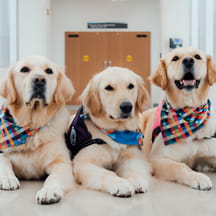Stephen Trzeciak, M.D., M.P.H., has been researching the effects of compassion in health care for nearly a decade. A physician scientist, professor and chair of medicine at Cooper Medical School of Rowan University, and the chief of medicine at Cooper University Health Care in Camden, New Jersey, Trzeciak’s latest research shows that the key to happiness lies in a free drug everyone can access.
“This wonder drug is serving others,” he says. “Research supports that serving others is not only beneficial for your physical health and your mental health, but also your emotional health, happiness, well-being, and even your professional success.” His latest book, "Wonder Drug," explains through neuroscience and clinical stories how being a giving, other-focused person is a secret superpower.
Hospital professionals serve others for a living. How is the wonder drug different from what they do every day?
Compassion is defined as an emotional response to another’s pain or suffering involving an authentic desire to help. It is distinctly different from a closely related word: empathy. Empathy is the sensing, detecting, feeling and understanding component. But compassion goes beyond empathy to do what we can to alleviate another’s pain or suffering to whatever extent is possible. You can think of it like this: empathy plus action equals compassion.
It is important to recognize that there is robust neuroscience behind these distinctions in terms. Using functional MRI brain scans, neuroscience researchers have found that empathy activates the pain center of the brain. Conversely, taking action with compassion activates the reward center of the brain and is associated with positive emotion. This is part of the reason why it feels good to help people.
Neuroscience research supports that if we focus on making meaningful differences for patients, even in the smallest ways, it will be rewarding, and the meaningful relationships that flow from that will counteract stress and promote resilience. So, the research supports “leaning in” to relationships in the hospital, not just with patients and their families, but also with our colleagues and coworkers.
What’s one “prescription” for this drug?
Start small. You do not have to quit your job, sell all your worldly possessions, move to a far-off country, and start hauling water from a distant well. No life upheaval is needed, just simple prism changes. Rather than changing your surroundings, the research supports that you just need to change your experience of your surroundings and look for all the opportunities to help and serve others in everyday life.



